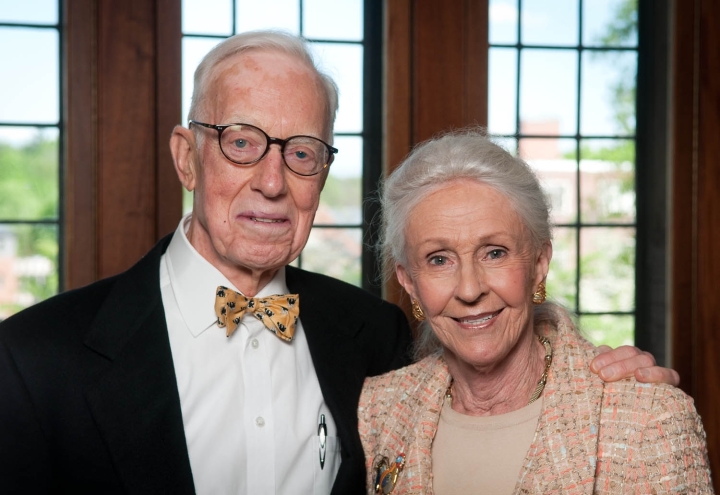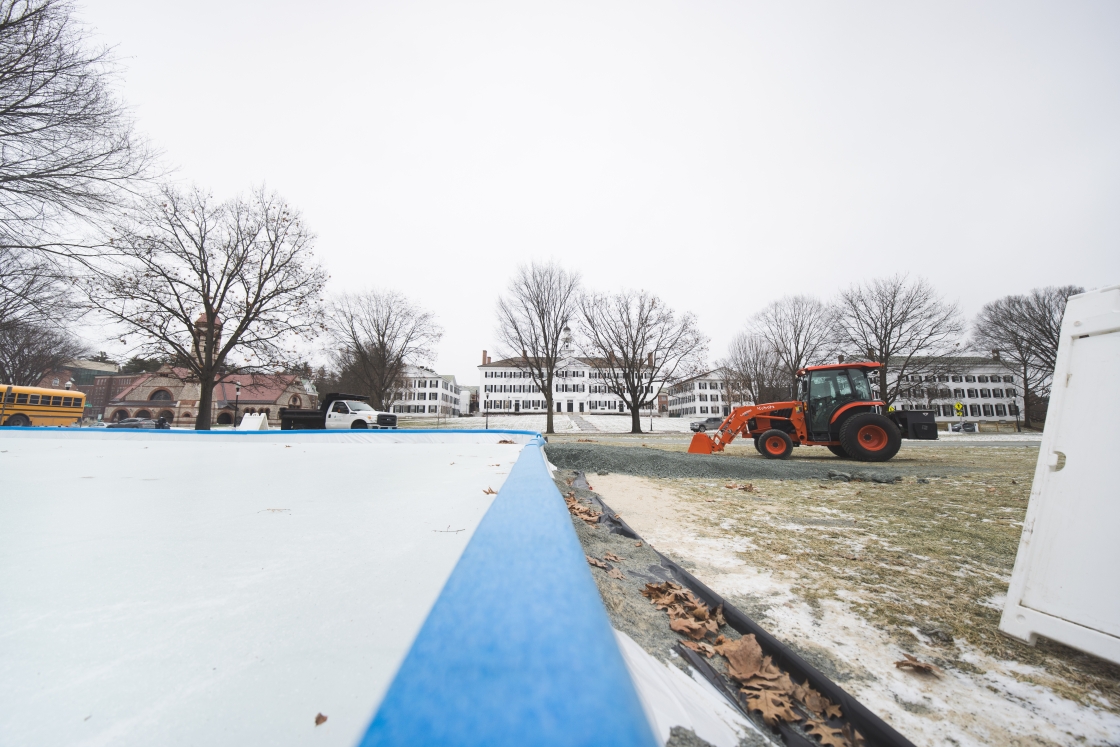Dartmouth will strengthen its expertise in U.S.-Canadian studies thanks to a $2 million gift from Dorothy and Norman “Sandy” McCulloch Jr. ’50, long-time supporters of the John Sloan Dickey Center for International Understanding.
The McCullochs’ gift establishes the McCulloch Program on Canadian-American Relations at the Dickey Center. The center has a long history of U.S.-Canadian teaching, research, and increased understanding, a legacy of John Sloan Dickey, who served as Dartmouth’s president for 25 years and championed U.S.-Canadian studies.
Sandy McCulloch served on the Dartmouth Board of Trustees from 1975 to 1988, the final three years as chair, and as an alumnus he became a close friend of President Emeritus John Sloan Dickey ’29. In the early 1980s, McCulloch was instrumental in creating the Dickey Center, helping define its programmatic scope, and establishing an endowment to support its operations.
He was the inaugural chair of the Dickey Center Board of Visitors, a post he held for 31 years. Particularly interested in America’s relationship with Canada, he remains active on the board as chair emeritus.
“Much of the U.S. has not yet come to appreciate what a rare relationship we have with Canada,” says McCulloch. “I believe we have to understand our differences better, not necessarily to settle them, but to have a deeper awareness of the differences. We also have to understand the ways we are very much alike. That creates important bonds for our two countries.”
Since its founding in 1982, the Dickey Center has offered a multi-faceted approach to advancing international understanding. No other Ivy League institution has such a comprehensive program that offers learning experiences to its full student body.
“I want to thank Dotty and Sandy for honoring the legacy of John Sloan Dickey with this remarkable gift,” says President Philip J. Hanlon ’77. “President Dickey was a leading Canadian-American relations scholar who expanded our knowledge and appreciation of the complex relationship between our two nations. Our enduring ties with Canada—the many Canadian students who join the Dartmouth community each year and our hundreds of alumni living north of the border—are testaments to President Dickey’s vision, expanded and enhanced by Dotty and Sandy’s generosity.”
Students from Canada have accounted for more than 10 percent of international undergraduates at Dartmouth in recent years, second only to China. More than 700 Dartmouth alumni live in Canada, and more than 40 Canadians have received honorary degrees from the College, including Prime Minister Lester Pearson and explorer Vilhjalmur Stefansson.
Decades of Service to Dartmouth
Sandy McCulloch, former CEO of the textile manufacturer Microfibres, Inc., was a founding member of the President’s Leadership Council, chaired the Campaign for Dartmouth, and served as president of the Alumni Council. In addition to their extensive giving to the Dickey Center, the McCullochs endowed the James O. Freedman Presidential Professorship. The McCulloch Graduate Fellows program and McCulloch Hall, a residential hall in East Wheelock House, are named in his honor.
Wendy Becker ’87, a member of the Dickey Center Board of Advisors, met Sandy McCulloch when, as president of the Student Assembly, she served on the presidential search committee that selected James Freedman to succeed President David McLaughlin.
“Sandy’s pillars of commitment to service, his family, and his career, combined with his New England disposition, have served as a framework that have shaped my past 30 years,” says Becker. “During the search for David McLaughlin’s successor, he led and prodded us to demand more of what we could be—to lead the world and instigate positive global change. He did that through ensuring a shared understanding of a better future and an unrelenting belief that it was Dartmouth’s role. Sandy is Dartmouth to me, embracing deep ambition and an iron-will commitment to make the College the best it can be for the world and for generations to come.”
The Dickey Center today oversees robust U.S.-Canadian programs focusing on health care, climate change, and the Arctic. Creation of the McCulloch Program on Canadian-American Relations will broaden Dartmouth’s teaching and research into several of the world’s most pressing issues within the context of U.S.-Canadian relations.
The program will:
- Increase student understanding of the Canadian-American relationship;
- Support research into Canadian issues to expand understanding of that nation’s politics, culture, and economics;
- Support collaborative work on issues of common interest, such as the Arctic, energy, public health, and human rights; and
- Fund campus visits by Canadian scholars and political leaders.
“A distinguishing feature of the Dickey Center is that students from all over campus, including all the professional schools, can take advantage of what Dickey has to offer,” says McCulloch. “I’m proud that the Dickey Center has such a wide reach across campus and such a broad approach to its global studies. It honors President Dickey’s vision to make our students aware of the world around them. Dartmouth was a smallish country college 70 years ago, and Dickey would bring diplomats and politicians to Hanover to emphasize the importance of international exposure.”
The McCullochs’ gift is the latest in a series of momentous gifts to the Dickey Center during the tenure of Daniel Benjamin, who is stepping down as the Norman E. McCulloch Jr. Director of the Dickey Center for International Understanding after seven years. Donors have given $16.1 million to the center during Benjamin’s directorship, establishing a legacy in all areas of the center’s programming.
Benjamin, who is departing to become president of the American Academy in Berlin, thanked McCulloch for his steadfast support of the center.
“I have been very fortunate to have Sandy first as chair, then chair emeritus, of the Dickey Center Board of Visitors. He’s been an extraordinary force at Dickey, with a deep passion for Canadian-American relations,” says Benjamin. “Establishing the McCulloch Program couldn’t be more timely. With the border between our two nations closed to non-essential travel, we have an increased awareness of just how firmly we’re integrated economically and socially. This is an exceptional moment for scholars studying the important ties between the two countries and our common issues.”


